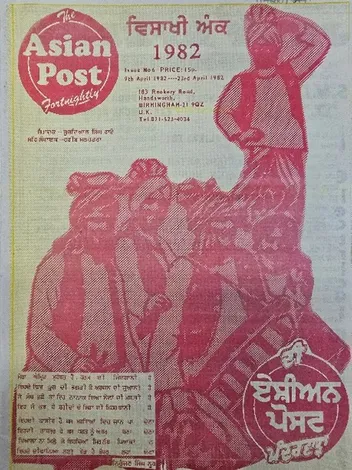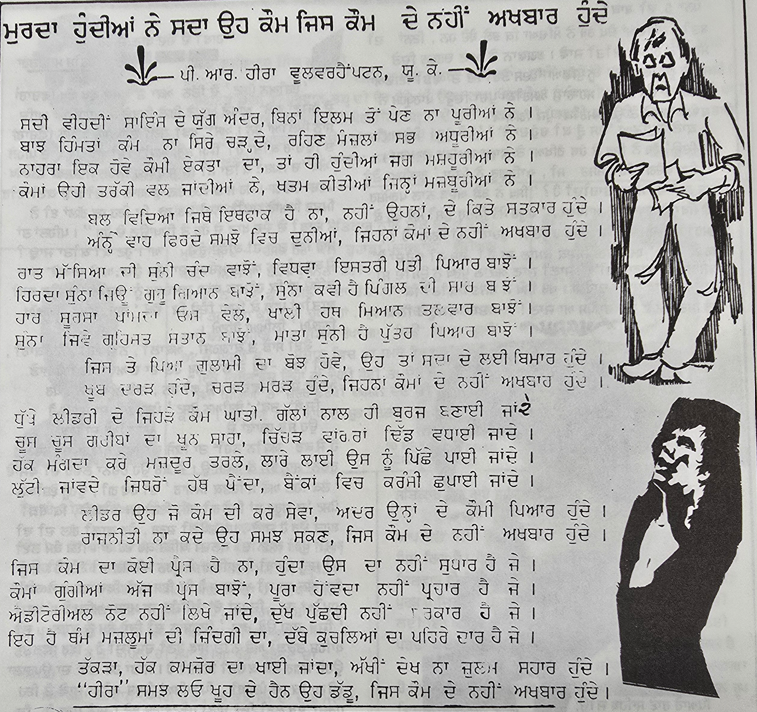Desi Writing Blog

Vernacular Voices:
British South Asian Writing in Punjabi, Urdu, Gujarati and Bengali
Welcome
These blog posts are short pieces on aspects of the British Asian vernacular literary world. Writings in South Asian languages by authors who settled in the UK from the 1950s come in the form of poetry, short stories and occasionally novels. These authors are rarely known outside of the language communities and thus these posts give an insight into them and their writings as well as a general idea of publishing and publications in the literary formation.
Follow Us



Punjabi print culture in the UK
A vibrant vernacular print culture emerged with migration from the sub-continent in the 1960s UK. This took the form of weekly magazines and transnational dailies (especially in Urdu. The following excerpts are from Punjabi magazines produced in Britain up until the 1990s. These are available in the Harbhajan Virk collection at the Coventry Archive (Herbert Museum and Gallery). Most of these were printed in the UK by Punjabi owned presses. Indeed, Harbhajan Virk himself bought a building in Coventry and set up a printing press (in 1989), establishing East West publications. These presses mainly relied on producing multilingual wedding cards and function invitation alongside flyers and leaflets for the general public. These activities subsidised the publication of Punjabi magazines. This was the same mode for all the vernacular languages, with Urdu presses mostly located in the North and Gujarati in Leicester and Bangla in the East End of London.

Launched in January 1982 with one of the major writing and literary vernacular writers and critics, Gurdial Singh Rai as editor and Marxist writer, Harish Malhotra as assistant editor, the Asian Post is a really lovely example of the kind of labour of love that magazine printing involved in the pre-computer era. The ramshackle cover, no doubt lovingly put together with a designed headline, an advert and an ornate border nicely represents the effort that these publications required.
As with other publications, special effort would go into festive editions, so the cover of the Vaisakhi edition, comes with Bhangra dancers.

Published in Birmingham, the Asian Post only lasted for a few years (fairly typical again) and relied on advertising from small business, usually collected by the editors through personal networks.
This wonderful poem from the Asian post by P. R Heera, a poet from Wolverhampton nicely sums up the rationale for this printing infrastructure. Titled: ‘Zombies for ever, those people, that nation with no newspaper!’

The ‘nation with no newspaper’ forms the poems refrain, with the last stanza offering us the importance of the printing press.
That nation with no printing press, has no chance to improve
People are mute without the press, there is no debate or information
Editorials are not written, troubles and strife get no answer
This is the support for the weak and wretched, the sentry of the oppressed
The weak loose a strong hand, the reported injustice is hard to bear
It is like a diamond for a frog stuck in a waterless well, that nation without a newspaper!
The author P.R.Hira from Wolverhampton may well be an established poet but may also be a pseudonym as many writers adopted pen names.
Magazines
Other magazines from the 1960s onwards of a similar ilk,
Charcha International – founded by Vishnu Dutt Sharma in the 1980s, then by Darshan Singh Dhillon (Slough), carried on to the 200s. An online version was available in 2020, under the name Charcha Qaumantri (https://charchaquamantri.com/)
Deshantar started in 1994, by Harbhajan Virk, Shashi Samundra and Munir Ahmed Quereshi – nice all Punjabi editor group. Prior to this Harbhajan Virk with Jasvir Virk had
Often there are international correspondents for magazines published in England. So the literary magazine Lakheer, with Prem Prakash as its editor and published in Jalandhar had Surjit Hans and CS Chan as correspondents.
Lok Shakti, another organ of the Indian Workers Association, which encompassed Ilford, Wolverhampton in the 1980s.
Roopvati (edited by Kailash Puri) and Pardesan were both specifically aimed at women readers.
Punjabi Darpan edited by Mr Kaushal out of London.
Well known writers Swarn Chandan edited Sooraj monthly out of London with Surjit Kaur Chandan as the registered proprietor.
